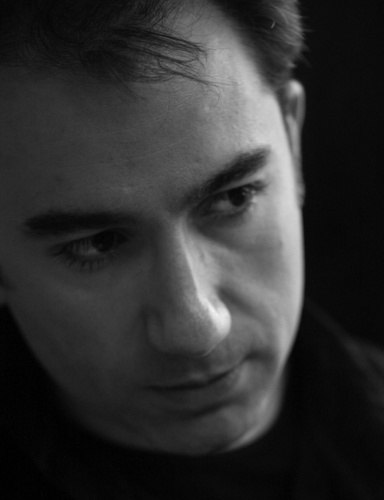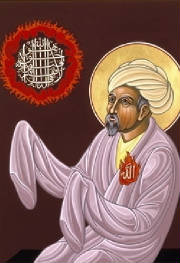 Shaikh Kabir Helminski
Shaikh Kabir Helminski
(Qur’anic translation and commentary by Muhammad Asad)
1. Witness objectively, without judgment: Ya Shahid
The purpose of human life can be stated as: to attain the knowledge of Reality. Everything that is given to human beings through revelation is to guide us to knowing our true selves and through our selves to attain the knowledge of all the dimensions of reality. Al Shahid is a key to the knowledge of reality. God is al Shahid, the Ultimate Witness, and every attribute of God is also an attribute of the true Human Being. We are in the process of becoming the non-judging, objective witness, al Shahid.
To begin, a reliable principle of the Process is: to let go of our judgments of what we see, and so to see more. Taking the stance of an impartial witness to our own experience opens us to what truly is and how we truly are. We are not here to judge or blame others or ourselves.
By noticing the stream of judging mind without trying to stop it, by just being aware of it, we are entering a state of self-knowledge where change is possible. Through greater witnessing, real intention and change can happen. The direction of this change, this transformation, is toward nobility of character.
In the Mevlevi tradition we refer to something known as safa-nazar: clear glance; clean, purified, serene look. These words describe the murshid’s glance at the salik, and how the salik should look at everything and everyone with an eye that knows unity. The salik should not look at anything with a darkened glance (kem nazar) or see things in a negative light as “bad” or “worthless;” he should see everything as appropriate according to its receptivity (mazhar) and aptitude (isti’dad). In this way, the salik will continually be in the presence of God – he will be contemplating the manifestations of God – and the eventual result will be the realization of unity (wahdet).
A man asked the Prophet Muhammad about nobility of character. He said, “It means that you should forgive him who has wronged you, re-establish ties with him who has broken them off, give to him who has denied you something, and speak the truth even if it is against your own interests.” (Mishkat)
Nobility of character is to more and more radiate blessing, to be a source of positive energy. Abu Hurayrah related that the Messenger of God, peace be upon him, was once asked to curse the idol worshippers, to which he replied, “I was not sent to curse; I was sent only as a mercy.” (Muslim)
In time We shall make them fully understand Our signs
[through what they perceive] in the utmost horizons [of the universe] and within themselves,1 so that it will become clear unto them that this [revelation] is indeed the truth. Is it not enough [to know] that your Sustainer is witness to everything? [41:53]And in whatever condition you may find yourself, and whatever discourse of this you may be reciting, and whatever work you [all, O men,] may do – [remember that] We are your witness2 [from the moment] when you enter upon it: for not even an atom’s weight [of whatever there is] on earth or in heaven escapes your Sustainer’s knowledge; and neither is there anything smaller than that, or larger, but is recorded in [His] clear decree. Oh, verily, they who are close to God3 – no fear need they have, and neither shall they grieve: they who have attained to faith and have always been conscious of Him. For them there is the glad tiding in the life of this world4 and in the life to come; [and since] nothing could ever alter God’s promises, this, this is the triumph supreme! And be not grieved by whatever people may say. Behold, all might and glory belong to God alone: He alone is all-hearing, all-knowing. [10: 61–65]
And [then,] the twilight of death brings with it the [full] truth5 – that [very thing, O man,] from which you would always look away! – and [in the end] the trumpet [of resurrection] will be blown: that will be the Day of a warning fulfilled. And every human being will come forward with [his erstwhile] inner urges and [his] conscious mind,6 [and will be told:] “Indeed, unmindful have you been of this; but now We have lifted from you your veil, and clear is your sight today!” And an intimate part of his own being will say: “This it is that has been ever-present with me!” [50:19–23]
Say: “None can bear witness between me and you as God does: verily, fully aware is He of His creatures, and He sees all [that is in their hearts].” [17:96]
In this, behold, there is indeed a reminder for everyone whose heart is wide-awake7 – that is, [everyone who] lends ear with a conscious mind8 – and [who knows that] We have indeed created the heavens and the earth and all that is between them in six aeons, and [that] no weariness could ever touch Us.9 [50: 37–38]
2. Patience: Ya Sabur
True patience comes from the acceptance of the unfolding of time. The Prophet said, “Haste is of the devil.” Surah Asr tells us that “everything is in loss,” except those who joined together for the mutual teaching and encouragement of truth and patience.
What benefit can there possibly be in rushing through some moments to get to others? Every moment is the perfect gift of the Divine, manifested for our benefit. Moments of difficulty and challenge are moments in which the soul has the potential to develop and awaken new qualities. Knowing this we can be completely open to each moment, accepting it as it is with gratitude.
…the Sustainer of the heavens and the earth and all that is between them! Worship, then, Him alone, and remain steadfast in His worship! Do you know any whose name is worthy to be mentioned side by side with His? [19: 65]
Hence, bear with patience whatever they [who deny the truth] may say, and extol your Sustainer’s limitless glory and praise Him before the rising of the sun and before its setting; and extol His glory, too, during some of the hours of the night as well as during the hours of the day, so that you might attain to happiness. And never turn your eyes [with longing] towards whatever splendour of this world’s life We may have allowed so many others to enjoy in order that We might test them thereby: for the sustenance which your Sustainer provides [for you] is better and more enduring. And bid your people to pray, and persevere therein. [But remember:] We do not ask you to provide sustenance [for Us]:10 it is We who provide sustenance for you. And the future belongs to the God-conscious.11 [20: 130–132]
…hence, remain patient in adversity – for, verily, God’s promise always comes true – and ask forgiveness for your sins, and extol your Sustainer’s glory and praise by night and by day.12 [40:55]
…if He so wills, He stills the wind, and then they lie motionless on the sea’s surface – [and] herein, behold, there are messages indeed for all who are wholly patient in adversity and deeply grateful [to God]… [42:32–33]
And contain thyself in patience by the side of all who at morn and at evening invoke their Sustainer, seeking His countenance, and let not your eyes pass beyond them in quest of the beauties of this world’s life: and pay no heed to any whose heart We have rendered heedless of all remembrance of Us because he had always followed [only] his own desires, abandoning all that is good and true.13 And say: “The truth [has now come] from your Sustainer: let, then, him who wills, believe in it, and let him who wills, reject it.” Verily, for all who sin against themselves [by rejecting Our truth] We have readied a fire whose billowing folds will encompass them from all sides; and if they beg for water, they will be given water [hot] like molten lead, which will scald their faces: how dreadful a drink, and how evil a place to rest! [18:28–29]
Hence, do not barter away your bond with God for a trifling gain! Verily, that which is with God is by far the best for you, if you but knew it: all that is with you is bound to come to an end, whereas that which is with God is everlasting. And most certainly shall We grant unto those who are patient in adversity their reward in accordance with the best that they ever did. [16: 95–96]
3. Clearing the heart and mind of idols: la illaha il Allah
This is the negation of heedlessness and the affirmation of the Real. Therefore, the Kalimah, la illaha il Allah, is a formula for purifying the mind of negative thoughts, judgments, fears, and inappropriate desires. All of these things prevent us from seeing things as they really are. What the Buddhists call “Beginner’s Mind” is in Islamic terms the mind cleansed of idols. In the remembrance of God, we are experiencing life as if from the mind of God, through the eyes of God, with goodwill, compassion, and mercy.
Too often our habitual thoughts and reactive emotions prevent us from seeing things as they really are. In other words, we fail to notice and be grateful for the gifts of life, for the subtle voice of divine guidance because we are so full with an inner noise. Yet reacting to the inner noise only produces more inner noise.
O men! Call to mind the blessings which God has bestowed upon you! Is there any creator, other than God, that could provide for you sustenance out of heaven and earth? There is no deity save Him: and yet, how perverted are your minds! [35:3]
…and never call upon any other deity side by side with God. There is no deity save Him. Everything is bound to perish, save His [eternal] Self. With Him rests all judgment; and unto Him shall you all be brought back. [28:88]
Too often we let our thinking and our beliefs about what we ‘know’ stop us from seeing things as they really are. We can learn to cultivate a mind that sustains an objective interest, willing to see everything as if for the first time. Being in this state of empty presence we are open to divine guidance and inspiration.
Such is God, your Sustainer: there is no deity save Him, the Creator of everything: worship, then, Him alone – for it is He who has everything in His care. No human vision can encompass Him, whereas He encompasses all human vision: for He alone is unfathomably Subtle, All-Aware.14 Means of insight have now come unto you from your Sustainer [through this divine revelation]. Whoever, therefore, chooses to see, does so for his own good; and whoever chooses to remain blind, does so to his own hurt. And [say unto the blind of heart]: “I am not your keeper.” [6: 102–104]
There shall be no coercion in matters of faith. Distinct has now become the right way from [the way of] error: hence, he who rejects the powers of evil and believes in God has indeed taken hold of a support most unfailing, which shall never give way: for God is all-hearing, all-knowing. God is near unto those who have faith, taking them out of deep darkness into the light – whereas near unto those who are bent on denying the truth are the powers of evil that take them out of the light into darkness deep: it is they who are destined for the fire, therein to abide. [2: 256–257]
4. Trust: Ya Wakil
Learning to trust in God develops out of the mind and heart that has become still and receptive. Learning to trust in what we know from our inmost selves is also only possible when the mind and heart become still and receptive. Actually, everything we seek is to be found within us through our humanness, through the point of contact given to us in our inmost heart.
Are they, then, not aware that We have set up a sanctuary secure [for those who trust in Us], while all around them men are being carried away [distracted by fear and despair]? Will they, then, [continue to] believe in things false and vain, and thus God’s blessings deny? [29: 67]
Someone who lives in a merely material universe, in which events are thought to be arbitrary and accidental, is more likely to suffer anxiety, doubt, and confusion. But if someone adopts a stoic attitude, a courageous heart, and acceptance of whatever happens, they are inwardly creating something like “faith.” But to really do so implies an inner focus, the presence of values, and the prizing of an inner quality. While those who merely brainwash themselves with the sentimental idea of trust in God while living heedlessly, unconscious in the most basic ways, may be further from the reality of trust.
The more aware we are, the more we can trust in our own ability to receive guidance, to see things as they really are, to trust that we are guided from the deepest part of ourselves, the heart which mediates the guidance of Allah. The more aware we are, the more heartful we are.
The more the heart is purified of egoism, the more we can trust and honor our feelings. Trusting in our own inner authority and intuition is really trusting in the greater intelligence of the Divine. Even if we make mistakes along the way, those mistakes become a mercy, a learning experience.
God is near unto those who have faith, taking them out of deep darkness into the light – whereas near unto those who are bent on denying the truth are the powers of evil that take them out of the light into darkness deep: it is they who are destined for the fire, therein to abide. [2:257]
The Sustainer of the east and the west [is He]: there is no deity save Him: hence, ascribe to Him alone the power of Trust (to determine your fate), and endure with patience whatever people may say, and avoid them with a comely avoidance. And leave Me alone [to deal] with those who give the lie to the truth – those who enjoy the blessings of life [without any thought of God] – and bear with them for a little while. [73:9–11]
5. Striving and Non-Striving: Jihad
The false self (nafs) will never be satisfied; so strive with God to be near to Him. So much of what we do to make ourselves better may arise from a feeling of insufficiency, from negative attitudes about ourselves, from the need to feel superior to others, and from selfish desires. The reason so much of our striving yields poor results is that the striving originates in the false self, the nafs. Such striving doesn’t have the support of the Divine.
Have you ever considered [the kind of man] who makes his own desires his deity? Could you, then, [O Prophet,] be held responsible for him? Or do you think that most of them listen and use their reason? Nay, they are but like cattle – nay, they are even less conscious of the right way! [25: 43–44]
The true striving is the striving in God, striving that begins with a clear and noble intention but also recognizes our need for divine support. Recognizing our need and/or helplessness is the prerequisite for making a sincere call to the Infinite, to the Sustainer of the universes who is all mercy and generosity.
Ibn Abbad of Ronda, a 14th century Andalusian Sufi, wrote in a letter to a student:
They endeavor to make Him their companion in all their spiritual states, insofar as they are able. When God discerns that attitude in them, He is merciful by causing them to attend no longer to their own weakness or strength in whatever they undertake or leave aside. Instead He is their safeguard and protection. He guarantees their welfare and sustenance, for they are His servants and are dedicated to serving Him… Muhammad’s faith community is therefore characterized by liberality and ease… This facilitation of every situation is made possible only through the contemplative vision of which I have spoken. God has said, may He be glorified and exalted, “He has laid no hardship upon you in religion; yours is the faith community of your father Abraham. And he has named you as “muslims” in this revelation as well as of old.” [Qur’an 22:78]… In Him alone do they move or take their rest; on Him alone do they rely; to Him alone do they raise their thoughts and aspirations…”
You do not need to become someone other than who you are; you simply need to become the best of yourself as you are intended to be by the Divine.
The best way to achieve your own goals is to back off from egoistic striving and instead focus on carefully seeing and accepting things as they are, moment by moment, with the Divine Friend as your companion in all states. With patience and regular practice, movement towards your goals will be facilitated naturally.
Shams of Tabriz said:
“If you sit with the people of paradise, they help you forget the anxieties of life. They are straightforward, and they wish good to everyone. With them your inside opens in such a way that even if someone swears at you, you just laugh. And their words touch you so much that you openly weep, and yet you feel a hundred thousand joys inside, and you burst into laughter. The dance of the people of Spirit is subtle and light. Yet on the inside they are like a mountain, or like a hundred thousand mountains. But outwardly they move like a rose petal on the water.”
O you who have attained to faith! Remain conscious of God, and seek to come closer unto Him, and strive hard on His Path, so that you might attain to a happy state. [5: 35]
But as for those who strive in Us – We shall most certainly guide them onto paths that lead unto Us: for, behold, God is indeed with the doers of good. [29:69]
Behold, the only [true] religion in the sight of God is self-surrender to Him; and those who were sent revelation in the past took, out of mutual jealousy, to divergent views [on this point] only after knowledge [thereof] had come unto them. But as for him who denies the truth of God’s messages – behold, God’s accounting is prompt! Thus, if they argue with you, say, “I have surrendered my whole being unto God, and [so have] all who follow me!” – and ask those who have been sent revelation in the past, as well as all unlettered people, “Have you surrendered yourselves unto Him?” [3:19–20]
6. Acceptance: Rida
Begin with acceptance; then listen to your heart. Acceptance is a beginning, a point of departure, as well as the culmination of heartfulness.
Our situation is like that of a guest that has been invited to a great event. We are here to enjoy the program, which also includes a feast, as well as many other invited guests. We are here to appreciate what we have been invited to, to be courteous to the other guests.
From another perspective, we are here to sense the value of what is happening here, to be grateful and to contribute to making this a positive event. Complaining about the other guests, the service, the menu, attempting to control a situation that is beyond our control is not wise. It would be wiser to sense the value of what is happening and allow it to benefit us. So let us accept the situation we are in and listen to our hearts.
Now, in contrast to the foregoing, imagine that you are a refugee fleeing your homeland with no more than what you can carry with you. What will give you the strength to carry on? In The Book of Survival what counts most is realistically assessing and accepting the situation you’re in. Only then can guidance and wisdom lead the way.
In both situations, acceptance of what is offers the best chance for the best possible outcome. There is nowhere else to begin than with acceptance of where we are right now. We begin by seeing ourselves and our circumstances accurately, seeing things as they actually are in the present. With conscious consent to what is at this moment we can know that this is the center of true beginning, where infinite divine Mercy meets our finite self.
If we see that we have been running through a maze of distractions and desires and have not been content at all, nevertheless, this is where we must begin. Acceptance, consent, and, finally, contentment is possible from the moment we wake up from that maze of manufactured desires and distractions; in that moment we may find that contentment begins with consent to our own being in this moment.
Know that the life of this world is but a play and a passing delight, and a beautiful show, and [the cause of] your boastful vying with one another, and [of your] greed for more and more riches and children. Its parable is that of [life-giving] rain: the herbage which it causes to grow delights the tillers of the soil; but then it withers, and you can see it turn yellow; and in the end it crumbles into dust… [57: 20]
We should ask ourselves, then: Have we given the world and its attractions undue importance? And if our desires lead us into injustice, corruption, dishonesty, and cruelty there will be an accounting. This ayat continues:
But [the abiding truth of man’s condition will become fully apparent] in the life to come: a great chastisement, and God’s forgiveness, and His goodly acceptance: for the life of this world is nothing but an enjoyment of self-delusion.
Because what we truly are is sustained and embraced by the Source of Life, we can sense at least the possibility of desirelessness, contentment, and consent to the moment. Because what we truly are is sourced in an Infinite Source, we can know the pleasure of being of this Source. We experience our connection with our Source when we are free from the coercion of habitual emotions and thoughts, in a state of pure being, as a living, witnessing presence. Rida essentially means to be pleased with what is.
[But unto the righteous God will say,] “O you human being that hast attained to inner peace! Return unto your Sustainer, well-pleased [and] pleasing [to Him]: enter, then, together with My servants – yes, enter My paradise!” [89: 27–30]This divine love is longing to be known, to be experienced, to be recognized. This is the whole purpose of life on earth, that the human being will rise to the purpose for which it was created, that the divine beauty and generosity will be apprehended, that we will recognize that we are being guided, nurtured, supported, and loved.
And for those who give consent in this life and reach contentment:
Their reward is with God: gardens of perpetual bliss, through which running waters flow, therein to abide beyond the count of time; well-pleased is God with them, and well-pleased are they with Him: all this awaits the one who stands in awe of his Sustainer! [98:8]
Whether amidst the harshest realities of this life, or amidst the surfeit of abundance that distracts us from our own being, rida, consent, being profoundly pleased with what is, opens us to the same state of heartful presence.
[1] I.e., through a progressive deepening and widening of their insight into the wonders of the universe as well as through a deeper understanding of man’s own psyche – all of which points to the existence of a conscious Creator.
[2] Lit., “witnesses,” corresponding to the majestic plural “We.” The specific reference to the Prophet and his recitation of the Qur’ān (implied in the singular form of address in the first part of this sentence) is meant to stress the supreme importance of divine revelation in the context of human life.
[3] The verb waliya (from which the noun waī, pl. awliyā’, is derived) signifies, primarily, the nearness or closeness of one thing to another: thus, God is spoken of in the Qur’ān (e.g., in 2:257 and 3:68) as being “near unto (walī) those who believe.” Although the term walī, when applied to God, as well as to the relationship between one created being and another, is often used in the Qur’ān in the sense of “helper,” “friend,” “protector,” “guardian,” etc., none of these secondary meanings can properly – i.e., without offending against the reverence due to God – describe man’s attitude to, or relationship with, Him. Consequently, the above reference to the believers as awliyā’ of God is best rendered as “they who are close to God,” in the sense of their being always conscious of Him. This rendering has the support of almost all the classical commentators. (Asad)
[4] I.e., the happiness born of the feeling of closeness to God and, hence, of spiritual fulfilment.
[5] I.e., full insight into one’s own self.
[6] Lit., “with that which drives (sā’iq) and that which bears witness (shahīd).” While the former term evidently circumscribes man’s primal urges – and particularly those which drive him into unrestrained self-indulgence and, thus, into sin – the term shahīd (rendered by me as “conscious mind”) alludes here to the awakening of the deeper layers of man’s consciousness, leading to a sudden perception of his own moral reality – the “lifting of the veil” referred to in the next verse – which forces him to “bear witness” against himself (cf. 17:14, 24:24, 36:65, 41:20 ff.).
[7] Thus Zamakhsharī; literally, the phrase reads, “who has a heart.”
[8] Lit., “or lends ear and is withal a witness (wa-huwa shahīd),” which latter phrase Zamakhsharī explains as meaning “is present with his intellect,” i.e., with a conscious mind. (Cf. the same use of the term shahīd in verse 21.) The conjunctive particle “or” (aw) which precedes the above clause does not signify an alternative but has – as is often the case in Qur’anic usage – an explanatory function, similar to phrases like “that is” or “in other words,” followed by an amplification of what was said before.
[9] The whole of this passage (verses 36-38) stresses God’s omnipotence, which can be perceived by “anyone whose heart is wide-awake.” The above reference to God’s having created the universe “in six aeons” is the oldest in the chronology of Qur’anic revelation. In this connection it is to be noted that in ancient Arabic usage the term yawm does not always denote the twenty-four hours of the earthly “day,” but is also applied to any period of time, however long or short. In the cosmic sense in which it is used here and elsewhere in the Qur’ān, the plural ayyām is best rendered as “aeons.” The mention of the impossibility of God’s ever being “wearied” by the process of creation connects the present passage with verse 15 of this sūrah and, thus, alludes to God’s power to resurrect the dead.
[10] My interpolation of the words “for Us” is based on Rāzī’s interpretation of the above sentence: “God makes it clear that He has enjoined this [i.e., prayer] upon men for their own benefit alone, inasmuch as He Himself is sublimely exalted above any [need of] benefits.” In other words, prayer must not be conceived as a kind of tribute to a “jealous God” – as the Old Testament, in its present corrupted form, frequently describes Him – but solely as a spiritual benefit for the person who prays.
[11] Lit., “to God-consciousness.”
[12] According to all classical commentators, the above passage is addressed in the first instance to the Prophet and, through him, to every believer. As regards the Prophet himself, see note 41 on the last sentence of 24:31.
[13] Lit., “and whose case (amr) was one of abandonment of [or “transgression against”] all bounds [of what is right].”
[14] The term latīf denotes something that is extremely subtle in quality, and therefore intangible and unfathomable. Whenever this term occurs in the Qur’ān with reference to God in conjunction with the adjective khabīr (“all-aware”), it is invariably used to express the idea of His inaccessibility to human perception, imagination, or comprehension, as contrasted with His Own all-awareness (see, apart from the above verse, also 22:63, 31:16, 33:34, and 67:14. In the two instances where the combination of laṭīf and khabīr carries the definite article al (6:103 and 67:14), the expression huwa ’l-laṭīf has the meaning of “He alone is unfathomable” – implying that this quality of His is unique and absolute.






Greetings of Peace. Would you kindly share the source of the soulful Translation of Quranic verses used in this article? Grateful for all your work, articles and videos.